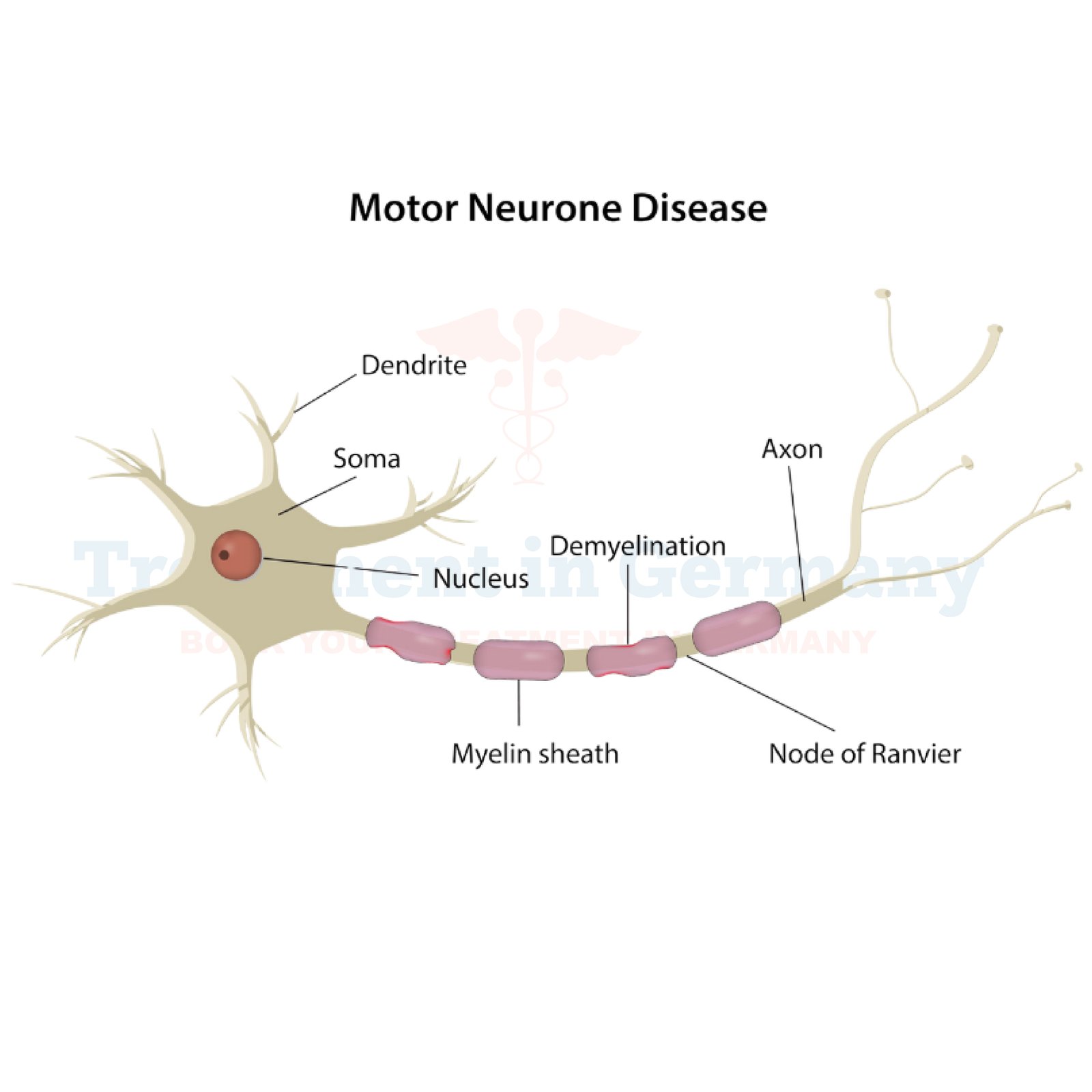Motor Neuron Disease (MND) Treatment in Germany
Motor Neuron Disease (MND) is a rare, progressive neurological disorder that affects the motor neurons in the brain and spinal cord, leading to muscle weakness, loss of function, and eventual paralysis. MND is often associated with Amyotrophic Lateral Sclerosis (ALS), its most common form. Germany, known for its advanced medical infrastructure and innovative therapies, offers some of the best diagnostic and treatment options for MND.
MND occurs when the motor neurons, responsible for controlling voluntary muscle movement, gradually degenerate and die. This impairs the brain's ability to send signals to muscles, causing progressive muscle weakness and wasting. The disease primarily affects adults, with symptoms usually appearing after the age of 40.
Types of Motor Neuron Disease
MND encompasses several subtypes, including:
- Amyotrophic Lateral Sclerosis (ALS): The most common type, affecting both upper and lower motor neurons.
- Progressive Bulbar Palsy (PBP): Primarily impacts muscles involved in speech, chewing, and swallowing.
- Primary Lateral Sclerosis (PLS): Affects upper motor neurons, leading to muscle stiffness.
- Progressive Muscular Atrophy (PMA): Affects lower motor neurons, causing weakness and muscle wasting.
Causes of MND
The exact cause of MND remains unclear, but several factors are thought to contribute:
- Genetics: About 5-10% of cases are familial, linked to genetic mutations.
- Environmental Factors: Exposure to toxins, heavy metals, or viral infections may play a role.
- Age and Gender: Most cases occur in individuals over 40, with men slightly more affected.
- Oxidative Stress and Inflammation: Damage to neurons caused by oxidative stress and chronic inflammation.
Symptoms of Motor Neuron Disease
MND symptoms vary depending on the subtype but typically include:
- Progressive muscle weakness and wasting.
- Difficulty speaking, swallowing, and breathing.
- Muscle cramps, twitching, and stiffness.
- Loss of coordination and mobility.
- Cognitive and behavioral changes in some cases, particularly with ALS.
Diagnosis and Diagnostic Tools
Germany offers cutting-edge diagnostic tools to ensure accurate detection of MND:
- Electromyography (EMG): Measures electrical activity in muscles to detect neuron damage.
- Nerve Conduction Studies: Evaluate the speed and strength of nerve signals.
- MRI (Magnetic Resonance Imaging): Identifies brain or spinal cord abnormalities.
- Blood Tests: Rule out other conditions with similar symptoms, such as autoimmune disorders or infections.
- Genetic Testing: Determines hereditary links in familial cases of MND.
Treatment Options for Motor Neuron Disease in Germany
Although there is no cure for MND, Germany provides comprehensive treatment options to manage symptoms, slow progression, and improve quality of life.
Medications
- Riluzole: The most commonly prescribed drug, which may slow disease progression by reducing neuron damage.
- Edaravone: An antioxidant drug that may help reduce oxidative stress in ALS patients.
Physical and Occupational Therapy
Customized exercise programs to maintain muscle strength and flexibility.
Assistive devices such as braces, walkers, or wheelchairs to improve mobility.
Speech and Swallowing Therapy
Speech therapists help manage communication difficulties.
Dietary modifications and feeding tubes to ensure adequate nutrition.
Ventilatory Support
Non-invasive ventilation (NIV) to assist with breathing difficulties.
Advanced respiratory care for end-stage patients.
Innovative Therapies in Germany
- Stem Cell Therapy: Under research, stem cells are used to repair or regenerate damaged neurons.
- Dendritic Cell Therapy: Investigated for its potential to modulate the immune system and slow disease progression.
- Gene Therapy: Targeted approaches to address specific genetic mutations causing familial MND.
- Clinical Trials: Germany offers access to experimental drugs and therapies through advanced clinical trials.
Why Choose Germany for MND Treatment?
Germany is at the forefront of medical care for neurological disorders like MND due to:
- World-Class Hospitals: Equipped with advanced diagnostic and therapeutic technologies.
- Specialized Neurology Centers: Focused on ALS and other MND subtypes.
- Experienced Specialists: Renowned neurologists and researchers in neurodegenerative diseases.
- Comprehensive Multidisciplinary Care: Teams of specialists, including neurologists, physical therapists, and speech therapists, working together for optimal care.
- Focus on Research and Innovation: Access to clinical trials and cutting-edge treatments unavailable in many other countries.
Prevention and Management
While MND cannot be prevented, proactive management can improve quality of life:
- Healthy Lifestyle: Balanced diet, regular exercise, and avoiding toxins.
- Early Detection: Seeking medical advice for symptoms like muscle weakness or twitching.
- Supportive Care: Joining support groups and using assistive devices.
- Regular Monitoring: Frequent check-ups to manage symptoms and adjust treatment plans.
Conclusion
Motor Neuron Disease is a challenging condition that requires expert care and innovative treatments. While there is no cure, Germany’s advanced healthcare system offers hope through comprehensive care plans, cutting-edge therapies, and access to clinical trials. With the right support and medical interventions, patients can maintain a better quality of life and slow the progression of this debilitating disease.
👉 Contact us for further information and receive a complimentary consultation.


.webp)
 (1).webp)

.webp)
 (1).webp)


.webp)
 (1).webp)

.webp)
 (1).webp)
